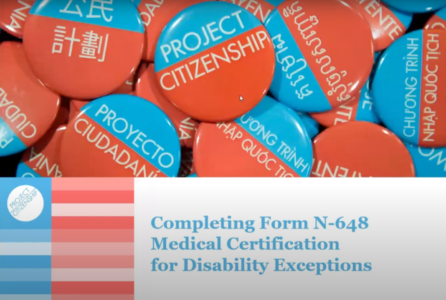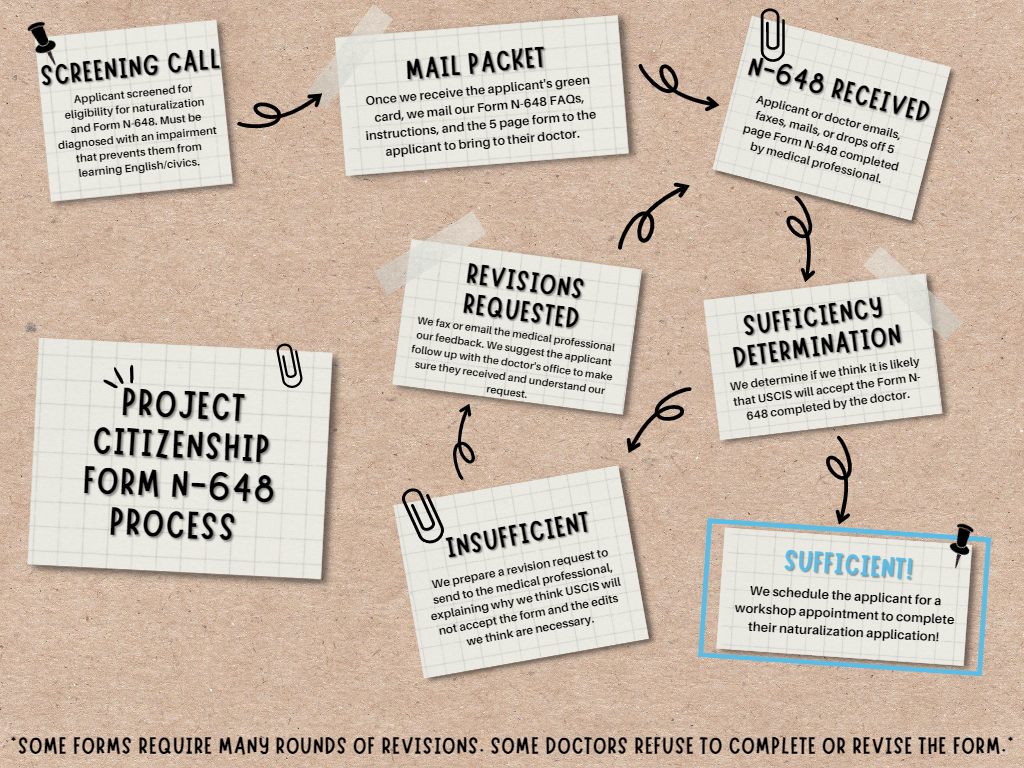N648 Disability Waivers
What is the N-648 or “Disability Waiver”?
A Medical Certification for Disability Exceptions, or Form N-648, exempts certain applicants for U.S. citizenship from possibly proving they can read, write, and speak basic English, and/or passing a test of U.S. history and civics. The waiver is available for applicants with a diagnosed medical condition, which will prevent the person from meeting the English and/or civics requirements. With a sufficient waiver, the applicant may have the interview in their native language and/or not have to answer questions about U.S. history and government, depending on the specific facts of their medical condition.
Who qualifies for an N-648?
There are three basic requirements for the N-648:
· The person has a physical or developmental disability or impairment;
· The condition has lasted or will last for at least 12 months; and
· The disability or impairment prevents the person from learning English and/or civics.
What type of medical conditions are required for an N-648?
The applicant must have a “medically determinable” mental or physical disability or impairment that makes the person unable to learn to read, write, or speak English, or to learn U.S. history.
Examples:
- Alzheimer’s and other forms of dementia
- Down syndrome and other cognitive impairments
- Physical illnesses or impairments that make it impossible to study, such as cancer patients who are on chemotherapy
Who should NOT submit the N-648?
If the applicant has a disability but CAN complete the English and civics requirement with reasonable accommodations, the applicant should NOT submit the N-648. Requests for reasonable accommodations due to a disability that does not render the applicant incapable of meeting the English or civics requirements may be made on the Form N-400. Illiteracy and/or advanced age alone are typically not sufficient to seek an exception to the English and civics requirements.
When do I have to submit the N-648?
The N-648 should be submitted with your N-400 application.
How do I fill out an N-648? Who can fill out an N-648?
Only medical doctors (M.D.), doctors of osteopathy (D.O.), and clinical psychologists are authorized to complete the form. The doctor must also be licensed in the United States or its territories. The doctor filling out the form must have examined the applicant. Should your doctor need an explanation of the form or guidance, please have them contact Project Citizenship.
What should my doctor include on the N-648?
The medical professional must:
· State the diagnosis and how it was made, including results of any testing that was conducted and a DSM-IV Code (for mental health conditions);
· Explain how the condition affects that patient’s memory, ability to learn new tasks, ability to concentrate, ability to understand abstract ideas, or ability to communicate; and
· Make a connection between the diagnosed condition and the applicant’s inability to learn or to demonstrate knowledge of English and U.S. history and civics;
· Attest that the medical condition has lasted or is expected to last at least 12 months; and
· Attest that the cause of the medical condition is not related to the illegal use of drugs.
The medical professional should complete the Form N-648 using common terminology that a person without medical training can understand. If your doctor needs an explanation of the form or guidance, please have them contact Project Citizenship.
The video below provides a comprehensive training for media professionals completing Form N-648:
How does USCIS decide whether or not to grant a waiver?
A USCIS officer will consider whether the medial professional has sufficiently demonstrated that there is a connection between the medical condition and the applicant’s inability:
· To read, write, and speak words in ordinary usage in the English language; and/or,
· To know and understand the fundamentals of history and of the principal form of government of the United States.
When will I be know if I have been granted a waiver?
A USCIS officer will decide whether to accept the form at the beginning of your naturalization interview.
What happens if my waiver is accepted?
If the Form N-648 is accepted at the naturalization interview:
· The interview should proceed in your preferred language with the use of an interpreter, if applicable;
· If the medical professional indicated on the form that you are unable to comply with any or part of the English and civics requirements, USCIS waives the indicated requirement(s);
· USCIS then proceeds to determine whether you meet all other naturalization eligibility requirements.
What happens if my N-648 waiver is denied?
If the N-648 waiver is denied at the naturalization interview, USCIS will proceed with the interview as if you had not submitted a Form N-648. USCIS will provide you with an opportunity to take all portions of the English and civics requirements. You must have two opportunities to pass the English and civics requirements before the application for naturalization is decided; once during the initial examination and then later during a subsequent re-examination interview. You may decline to complete the English and civics requirements, however, declining to continue the interview or complete the requirements counts as a failed attempt to pass the English and civics requirements. Failure to appear at the re-examination or hearing on a denial or to complete the requirements for any reason will result in a denial, unless excused by USCIS for good cause.
Who can serve as an interpreter?
To qualify as an interpreter for purposes of an immigration interview, an individual must be:
· Sufficiently fluent in both English and in the interviewee’s language, and
· Able to interpret impartially and without bias.
If the officer determines either before or during the interview that an individual cannot meet these standards, the officer may disqualify the individual from being an interpreter. Interpreters should be 18 years of age or older. An interpreter may never be: (1) an attorney or accredited representative for the applicant or (2) individuals under the age of 14. Family members will generally be disfavored as interpreters if there is another qualified interpreter available to the applicant.
How can Project Citizenship help me with my N-648?
Project Citizenship can provide guidance to medical professionals on how to most effectively fill out the N-648 for our clients.


